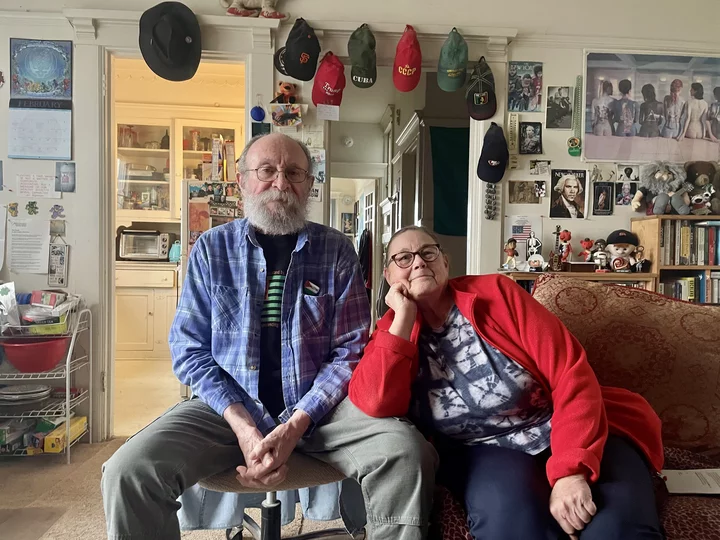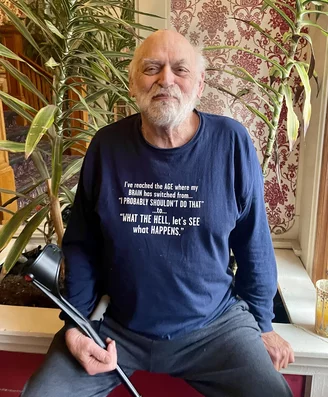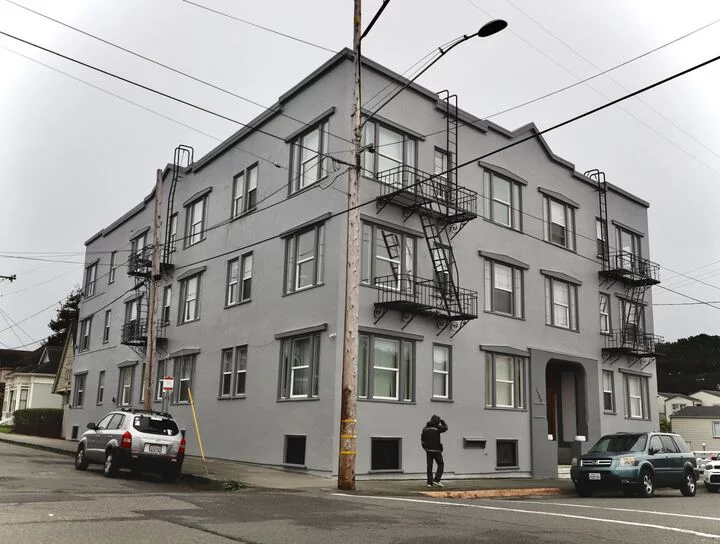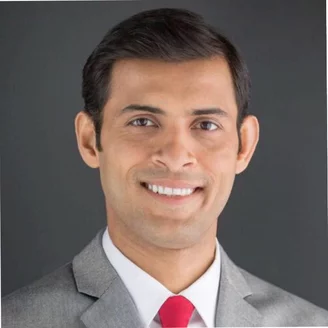Don Swall and Vanessa Vachon are among the residents of the Hillsdale Apartments at 1140 E Street in Eureka. | Photo by Ryan Burns.
###
A little over a week ago, the renters living in the Hillsdale Apartments, a three-story, 106-year-old building on E Street in Eureka, found a notice on their doors from the new owner, a corporation called Dwivedi Tower LLC. The subject line reads, “New Lease Agreement with Fair Market Rent (FMR).”
The printed notice, which you can read here, explains that all existing month-to-month leases will expire on Feb. 28, and new leases will commence the next day, March 1, with the following fair market rents:
- Studio: $1,065
- One Bedroom: $1,132
“A representative from Dwivedi Tower LLC or designated property management company will be contacting you within 1 week to schedule a meeting to discuss the new lease terms and answer any questions you may have,” the notice reads.
This announcement sparked alarm and anxiety among renters, many of whom are low income and have been paying hundreds of dollars less than those amounts per month. The notice does inform tenants that they have the right to review the proposed new lease agreement carefully, as well as the right to “negotiate lease terms within reasonable limits.”
But immediately below that it says renters who do not agree with quoted fair market rent amounts “can choose to vacate the property on or before February 28th, 2025,” adding, “A move out Notice is required by January 31st, 2025” — a date just a few days after the notice appeared.
This was interpreted by many tenants as an ultimatum — pay up or move out — according to more than half a dozen of them interviewed by the Outpost. A few said it struck them as a blatant violation of California’s Tenant Protection Act of 2019, which prohibits landlords from increasing rent in any 12-month period by more than 5 percent plus the increased the cost of living (following the Consumer Price Index) or 10 percent total, whichever is lower. In non-metropolitan areas such as Humboldt County, the 2025 CPI increase is 3.8 percent, meaning local rents can’t legally be increased by more than 8.8 percent in any one-year period.
However, not everyone knows about that legislation, and over the past week and a half most of the tenants of the Hillsdale Apartments have signed new leases, with some agreeing to rent hikes of 40 percent, 50 percent or more.
Allen Moore, for example, who lives in Apartment 8, on the ground floor. When we met him in the floral-wallpapered lobby of the Hillsdale Apartments he was seated on the edge of a planter box, holding a walking stick.
“I’d stand up but I can barely walk,” he said apologetically. Eighty years old and disabled, Moore said he recently met with his new landlord, Anil Dwivedi, the 33-year-old man behind Dwivedi Tower LLC, and tried to negotiate with him.
“I was sitting right here on the steps, and he came up here and started going through all the papers and saying, ‘Sign here, sign here, sign here.’”
Moore has lived in the building for four and a half years, and until this month the rent on his studio apartment was $720 per month. He said he felt pressured by Dwivedi, who handed him a “raft of papers” to sign. Moore said he tried to negotiate but Dwivedi only offered to waive a one-time security deposit of $135.
So Moore signed a new lease under the quoted fair market rent amount of $1,065 per month, a 48 percent increase, which he said he’s unable to afford. Paying that much rent on his fixed income would leave him with only $80 per month for gas and food, he said. So why did he agree to the massive hike?
“I don’t want to be kicked out of my room,” Moore said. “I don’t want to live in my car. I’m 80, and I got serious health problems. I’d end up dying within a month of pneumonia or something.” Moore, who said he’s been hospitalized three times in the past year after suffering a heart attack, was unaware of his rights under the Tenant Protection Act, and he said Dwivedi didn’t inform him.
Other residents in the building are holding out, refusing to sign a new lease despite pressure from Dwivedi and the management company he’s hired. A few told the Outpost that they’ve retained legal counsel and plan to defend their rights as tenants.
Dwivedi, for his part, said these dissatisfied residents are in the minority, and they’re being unfair and dishonest. In two separate interviews — one by phone, the other in the office of another apartment building he owns, the low-income Eureka Central Residence on Fourth and E streets — he maintained that his negotiations with tenants have been fully legal, even amicable, in most cases.
He insisted, repeatedly, that he informed all tenants of their legal rights while also telling them about his own situation, which includes risky seven-figure investments, elevated mortgage rates, property improvement costs and huge insurance hikes in the wake of the L.A. wildfires.
“I had personal meetings … and they wrote me a letter saying what they offered me, and they think that is a fair price,” Dwivedi said. “They put their case, I put my case, and then we came to a number which my tenant offered.”
Asked why tenants would volunteer to pay more rent than they’re legally required to, Dwivedi replied, “Because I told them what my situation is. … I asked if they voluntarily want to come to a number that can be helpful for both of us, and most of them did. … Because they understand. They’re good people.”
The tenants we interviewed disputed Dwivedi’s description of these negotiations, but when we asked him about the discrepancy he said he stands by the signed documents he obtained. For example, when told that Mr. Moore felt pressured into signing a new lease and is now distraught at the prospect of becoming homeless, Dwivedi pulled out one of the pages he’d had Moore sign. It’s a statement attesting to the “mutual agreement” of new lease terms. It reads, in part, “I confirm that I entered into these negotiations freely and willingly, without any undue influence or coercion. I am fully satisfied with the term we agreed upon.”
“Mr. Moore … he signed it,” Dwivedi said.
When we relayed what Moore had confessed about not fully understanding what he was signing and feeling he had no alternative, Dwivedi was unmoved.
“I believe more [in] what he told me. … He told me he’s fine,” he said. “I believe more [in] the documents. If he can back up his claims, because I’m backing up my claims.”
The Hillsdale Apartments building, constructed in 1919. | Photo by Andrew Goff.
###
Before moving to the United States about a dozen years ago, Anil Dwivedi was a a Hindu priest and student of Sanskrit in his native India. He also worked as an assistant director in the Bollywood film industry, he said, and eventually wrote, directed and produced a 23-minute short film called “Devi — The Little Goddess,” which he said was screened at a number of film festivals.
He describes himself as a world traveler (his social media includes photos of himself and his wife visiting the Egyptian pyramids, Thailand, Hong Kong, a tropical paradise and other locales), and in our interview he said traveling to different countries expanded his perspective, giving him “an eagle’s eye view” of humanity that transcends the exclusivity of many religions.
After immigrating to Temecula in Southern California to be with his wife, Dwivedi got involved in real estate — not only because he saw it as a better investment than the stock market but because it helps people, he said.
“I personally like to meet my tenants, everyone. I like to know what their condition is, what the situation is, what their background is [and] what they’re dealing [with],” he said.
His investments included a hostel in Koh Phangan, Thailand, though he no longer owns it.
Dwivedi purchased the Eureka Central Residence last April after a “big broker” friend in New York told him about the investment opportunity, he said. The building’s 20-year contract with the U.S. Department of Housing and Urban Development (HUD) was about to expire, and Dwivedi said that if he cared only about profits he could have kicked out the 36 tenants receiving rental assistance.
“If I wanted to make money I would have gotten, like, 50 percent more … [if I] evicted these 36 families,” he said. After meeting with them personally, though, he decided to renew the HUD contract for another 10 years. “In this way I’m able to help these 36 families,” he said.
(Another provision of the Tenant Protection Act: renters who’ve lived in a place for at least a year can only be evicted for “just cause,” including specified circumstances where the tenant is at fault or in a limited number of “no fault” situations, such as necessary demolition/remodels or a government order to vacate the unit.)
A Jan. 8 post on the social media site NextDoor accused Dwivedi of planning to evict the tenants of the Eureka Central Residence, which he labeled “Dwivedi Tower” in an Instagram post (above). Dwivedi said those claims are baseless. He renewed the HUD contract in October and allowed the government to dictate rent amounts.
“Whatever rent HUD decided, I accepted it, because I wanted to help these people,” said Dwivedi, who now lives in Eureka with his wife. He added that he’s spent almost half a million dollars renovating the building with new wood floors, fresh paint, plumbing repairs, professional carpet cleaning and more.
Late last month Dwivedi closed escrow on the Hillsdale Apartments, which he bought for $1.65 million — more than half a million under the $2.2 million asking price. He said he posted the notices with fair market rent amounts so tenants could see that they’ve been paying way below the going rate. He’s frustrated that the building’s previous owners neglected to make incremental increases to keep up with the market, putting him in an unfair position.
“Now it looks like I’m the villain,” he said. “I’m facing a lot of hatred. I cannot even sleep at night … . It’s like, just put yourself in my shoes and walk at least a mile and see: How would you be surviving when you’re getting income from between 2005-10 and your expenses are 2025? … That’s the reality. … I’m not doing anything illegal, and I’m trying to make sure that I understand every single person, personally. Every single tenant.”
###
Don Swall, a retired school teacher and member of Veterans for Peace, has lived in the Hillsdale Apartments for 18 years. Nearly 85 years old (his birthday’s in April), he said he’s been diagnosed with terminal liver cancer and only recently finished treatment for esophageal cancer. He’s not convinced of Dwivedi’s good intentions.
“Everybody in the building is getting fucked by this,” he said. Swall has been paying $621 a month for his third floor, one bedroom apartment, and he said the $1,132 fair market rent — an 82 percent increase — would quickly make him homeless. He has yet to meet with Dwivedi personally and said he’s not in a hurry to do so.
“He’s been in the building, but the people I know who are as pissed off as I am just won’t talk to him,” Swall said.
When told that Dwivedi claims to have explained everyone’s tenant rights, Swall offered a blunt assessment: “He’s a lying motherfucker,” he said. “A slumlord.”
Another resident, Matt Charbonneau, told the Outpost that he immediately recognized that a rent hike to the quoted fair market amount would violate his rights under the Tenant Protection Act. He’s been trying to negotiate new lease terms via email, to no avail.
“I have asked for written documentation of the new lease terms, but Dwivedi Tower LLC has refused to provide them,” he told the Outpost via email. “This rent increase will force many tenants out of their homes, as most of us cannot afford such a drastic jump.”
He forwarded his email chain with management, wherein he asserts his rights and asks repeatedly for a copy of the new lease. Management responds with requests to meet in person.
“I totally understand your concern,” reads a Jan. 28 reply from a Dwivedi Tower Gmail address. “It’s not a rent increase although it looks like it, it is a new lease sign up with a new move in with FMR [fair market rent] from March 1st. … If you would accept our invitation to meet up we can explain everything in detail. We have to meet up with you and come to an agreement before January 31st.”
Another email offers a bargaining chip: “We will be adding common WiFi for every tenant so they can save about $100 on their internet bill.”
Charbonneau remained unconvinced. He wrote back, “I find it concerning that you are refusing to provide written documentation of the new rental terms. … Once I have the details in writing and have had a chance to look them over we can schedule a time to meet in person.”
Reached by phone, Charbonneau said Dwivedi never acknowledged his tenant rights but said everything he’s doing is legal.
“He assured me that he’s had a team of attorneys review everything,” he said.
Amber Kirst did meet personally with Dwivedi. She agreed to do so after he knocked on her door last week. At the meeting, she said, he alternated between playing on her emotions and attempting to strong-arm her into paying at least $1,000 per month, a 54 percent increase over what she’s been paying.
“He’s like, ‘Hey, I understand what you’re going through. The price of groceries has gone up. The price of everything’s gone up.’ But then he’s all, ‘You’ve gotta understand my perspective. My insurance has tripled in California. I have to [support] my family. I have to pay my bills. … Can’t you empathize with that?’ … I said I can, but you need to understand my situation too, you know. Like, this is illegal.”
When she held her ground, she said, Dwivedi threatened to evict her under the pretense that her apartment needed to be renovated.
“Just straight up, he was blunt,” Kirst said. “And I’m just looking at him. I cannot believe he’s saying this to me.”
When she offered to pay 10 percent more per month he refused to accept it, instead tapping his finger on a piece of paper with “$1,000” written on it, she said. Again he appealed to her to see things from his perspective. “I look at him and go, ‘You want me to empathize with you when you literally just tried to bully me?’”
Dwivedi disputed this account, saying he never threatened to evict her, though he added that he may be forced to do building renovations at some point. He again attested to telling every tenant he’s met with about their rights and inviting them to negotiate.
“Yeah, right,” Swall said sarcastically. “He puts a loaded gun to your head and says, ‘We’ll negotiate.’”
We interviewed Swall in his apartment alongside his downstairs neighbor, Vanessa Vachon, a 68-year-old who worked on housing issues when she was employed by the County of Mendocino. “So I’m not coming from an ignorant place,” she said.
She ignored voicemails from Dwivedi asking her to meet with him, and she declined an in-person invitation when he knocked on her door. She has obtained legal representation and plans to fight the rent hike. (Hers would go up by nearly 60 percent if raised to the quoted fair market amount.)
Swall is also holding out while seeking legal advice, and he’s not interested in negotiating. He and Vachon believe that even if they manage to negotiate a deal with Dwivedi to keep their rent increases within legal limits, he’d simply convince other tenants to make up the difference.
“We’ve got several people here that are disabled and that may not have as much wisdom about housing and the laws and everything,” Vachon said.
Another tenant, who asked to remain anonymous due to fear of losing their security deposit, said that after trying unsuccessfully to argue with Dwivedi against a $400 rent increase, they opted to put in their 30-day notice.
“Somebody who thinks this is in any way legal or moral is not somebody I want to be in contract with,” the person explained.
The Eureka Central Residence, aka Dwivedi Tower. | Photo by Andrew Goff.
###
When we met with Dwivedi in his office at the Eureka Central Residence (or Dwivedi Tower), he showed us copies of a few signed leases for less than the fair market rent amounts, including one for $698 per month, two for $726 per month and one for $770.
Asked how some people managed to get these deals while others are paying hundreds more, Dwivedi said it’s because they explained their situation. Some are students; another is disabled.
“Everybody’s making ends meet,” he said. “Whoever’s not making [it], their rent did not go up.”
When reminded about Mr. Moore, Dwivedi said, “If he could not afford [a $345 per month increase], why would he agree to rent [at that price]? Why would he sign [something] saying he was not pressured?”
Told that Moore said he didn’t understand everything he was signing and is now worried about becoming homeless, he again pointed to the signed document on the desk in front of him.
“I think if they signed with their free will, I would go by that. … If he told you that [he was distraught], he’s being influenced by Don and Vanessa,” he said, referring to Swall and Vachon. “If they keep doing that, then I might have to evict them.”
Based on what?
“Based on, I might find a reason,” he said.
When we pointed out that this was likely illegal (the Tenant Protection Act explicitly prohibits landlords from taking retaliatory measures against tenants who exercise a legal right), Dwivedi said he’d find a legal reason and noted that their February rent check was late, for one thing.
Immediately after this flex of his authority, Dwivedi’s tone shifted.
“I am struggling a lot,” he said. “You know, my insurance, if I don’t pay the mortgage, which is, like, really huge for that building, if I don’t pay on the first it would go [into] foreclosure. If I don’t play sixty-plus-thousand dollars a year just on that building, it will go in foreclosure. So I am trying to stay afloat, sir.”
He again mentioned the LA wildfires, which were burning while he was in escrow on the Hillsdale Apartments, forcing him to choose between accepting a much higher insurance rate or back out of the deal and lose his earnest-money deposit.
He believes some of the resistance he’s facing from tenants stems from their racist attitudes toward him, and he said that, fundamentally, he’s trying to help the local community.
“I put [up] a lot of investment …,” he said. “And I have the potential to bring millions of dollars from all the way from Southern California. I know a bunch of investors. [But] if that’s how this community reacts to change, it’s not gonna happen.”
If tenants think he’s being unfair, they need to think about things from his perspective, he said.
“When you sit [on] this side of the table, things are different. … I’m just 33. My hair is gone!” he said, gesturing toward his thinning scalp. “It’s not like my hair is gone because genetics; everybody’s in my family has hair. [This is because of] how much stress I have.”
He brought up the recent NextDoor post and said he’s faced “so much bashing. I feel like it just keeps happening to me.”
Reiterating that he has an “army of lawyers,” Dwivedi said, “So whatever I’m doing, I’m doing legally. … I have been advised by, like, [an] entire firm. … This inflation economy is hard on everyone. [Look at] how much I am suffering. I wish I could go in front of someone and cry like, ‘Look, I’m suffering too. I am shoved against the wall, especially with the insurance.’”
Earlier this week, Dwivedi posted an ad for “3 Cozy studios available” in the Hillsdale Apartments. He’s asking $1,095 per month plus a $49.99 non-refundable screening fee. He also posted a link to the ad on Facebook, where commenters accused him of being selfish, greedy and a scammer. In response to a complaint about the screening fee, Dwivedi clapped back, saying the complainer was clearly “trying to spread hate and division by confusing/lying to people.”





CLICK TO MANAGE